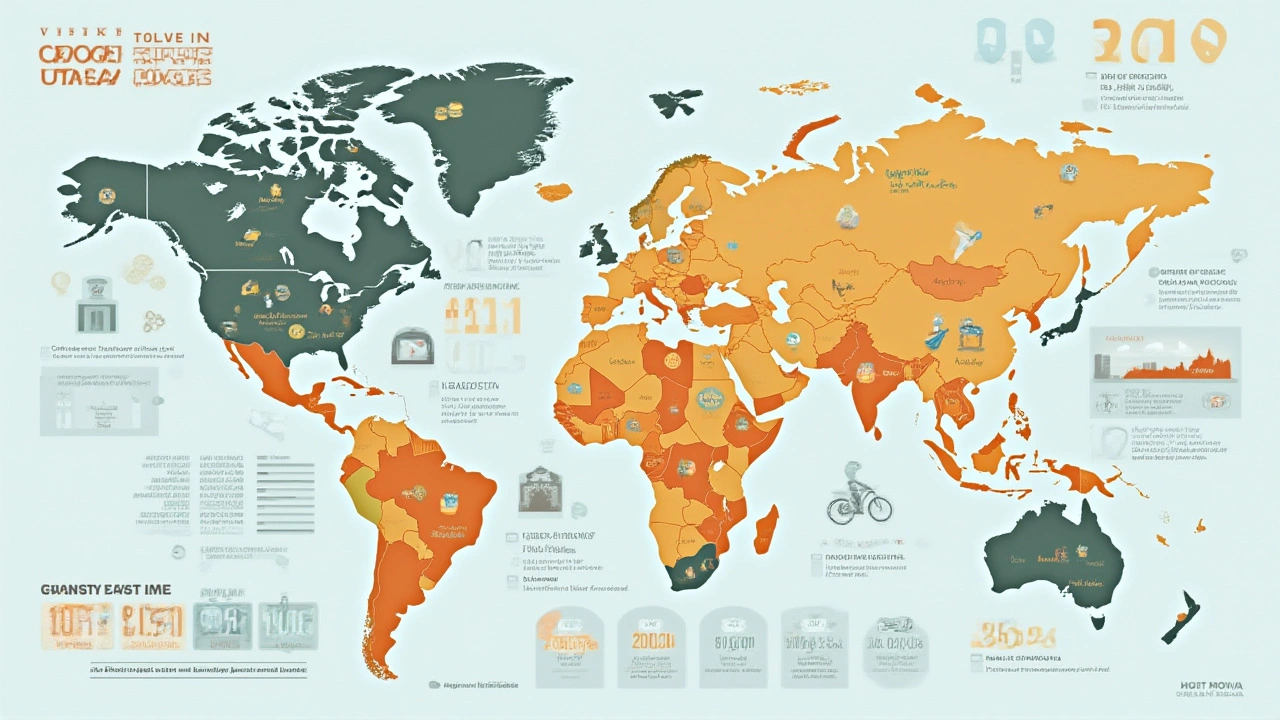
Looking for the cheapest country to live in is a bit like hunting for buried treasure—there are rumors everywhere, but the real prize takes some digging. Rent in Manchester lately? Feels like you need to sell a kidney for a one-bed flat. No wonder so many people are asking, "Where can I actually live without going broke?" Whether it's the pull of a tropical beach, mountains that touch the clouds, or just the comfort of knowing you’ve got your expenses under control, finding an affordable country is more than just a curious Google search. It can be life-changing. And you’re not the only one eyeing a flight to somewhere cheaper; the number of British expats living abroad jumped by 23% in the past ten years, and cost of living is a top reason. But before you start daydreaming of endless sun and low bills, it’s worth knowing what’s possible—and what to watch out for.
What Makes a Country Cheap to Live in?
So, what actually makes a country 'cheap'? It's not just the price of a pint or a loaf of bread. It's the full package: food, rent, transport, health care, even how much you pay to catch a bus or go see a doctor. Inflation can twist things fast, so the answer keeps changing. One year, Vietnam tops the lists, the next it’s Bolivia or Georgia. Why’s that? Because currency exchange rates dance around, rental markets change, and sometimes, cheap doesn’t mean cheerful—especially if your visa is hard to get, or you feel cut off from home. But, break it down and a few core things matter most:
- Housing: Rent is nearly always the biggest cost, unless you buy a shack in the wilderness.
- Food & Daily Essentials: Will your groceries take a huge chunk out of your paycheque? Or will local fruit and veg cost pennies?
- Utilities and Internet: Not very glamorous, but if you have to pay double for watery Wi-Fi and heating, cheap rent doesn’t help much.
- Transport: Cities with decent cheap public transport win big here, unless you fancy buying a scooter and braving local traffic rules.
- Healthcare: Not exciting, but knowing if you’ll go bankrupt from a hospital visit is pretty important.
- Safety and Simplicity: Some places are dirt cheap but complicated or dangerous to live in. Cheap isn’t always cheerful.
The World Bank’s 2024 survey put countries like Pakistan, India, and Bangladesh as the lowest for average living costs, but expats often avoid parts of those countries due to safety and lifestyle reasons. More practical options, where you get safety, fun, and cheap prices? Think countries like Vietnam, Cambodia, and Georgia. Don’t forget, too, the world changes fast—ask any expat in Thailand after the 2023 currency swings.
The Standout Cheapest Countries in 2025
The answer to the "cheapest country to live" question depends on your expectations, but the front-runners in 2025 are a lively bunch. Let’s break down the heavy-hitters—where British expats, digital nomads, and adventurous pensioners are getting the best deals right now.
- Vietnam: This one’s practically legendary for its low costs and insanely good street food. In lively cities like Ho Chi Minh or even Da Nang, you’ll find rents for £220-£350 a month, and noodle soup for less than a quid. Utilities and WiFi are reliable, and getting around by scooter is both fun and cheap—though you’ll need nerves of steel in the traffic. The catch? You’ll have to renew your visa regularly unless you land a job or long-stay permit.
- Cambodia: Siem Reap and Phnom Penh are buzzing with expats, drawn by some of the cheapest rents in Asia. You can find decent flats for under £200 a month, and international cafes everywhere means you’ll never be short of a familiar bite. Healthcare’s decent in major cities, but you’ll want to have travel insurance just in case.
- Georgia: Not the American state, but the tiny country sandwiched between Europe and Asia. Tbilisi’s got fast WiFi, a rising tech scene, and some of the best value wine on the planet. You can rent a flat here for £150-£300 a month, grab a lunch for £2, and ride the metro for pennies. The government also makes it easy for Brits to get a one-year visa, and lots of digital nomads love it for the friendly locals.
- Bolivia: South America’s dark horse. Cities like Sucre and La Paz are packed with colonial architecture, markets where you can eat heartily for £1, and spotty but cheap public transport. Monthly living expenses can sink to £400 if you stick to a simple lifestyle. Spanish helps a lot, and altitude sickness is a real thing at first.
- India (Smaller Cities): While Mumbai and Delhi will chew through your cash quickly, smaller cities like Jaipur, Kochi, or Chandigarh are a steal. Meals can cost pennies, rent is low (as little as £80-£150 a month), and the culture is overflowing. But, you’ve got to be ready to adapt to new sounds, smells, and rules.
The wild card? Argentina. After its recent financial circus, the peso crashed again. Cities like Mendoza and Cordoba let you live well for less than £400 a month, with famously good steak and wine. The catch: high inflation, so cash needs to be managed creatively, and things can shift quickly.

What Daily Life Really Costs in the Cheapest Countries
Any search for "cheapest country to live" spits out numbers, but what’s the story behind the stats? The reality is, if you want to live like a local (walking, eating street food, renting a standard flat), you’ll spend much less than if you seek out western-style goods. Take Vietnam, for example: a local breakfast is 70p, a city bus is a fifth of the UK price, and beer is sometimes 50p a pint. But, pop down to the fancy expat mall and pay UK or US prices for imported cheese. It’s the same in Georgia or Bolivia—imported goods are pricey, but local fare is a bargain. The trick is to blend in, eat what the locals eat, and keep the western luxuries as rare treats.
Let’s look at a basic monthly budget for a single person living comfortably in a "cheapest" country—not scraping by, but not living like a king either. Rent: £200-£300. Food: £60-£120. Utilities and Internet: £20-£40. Transport (local buses or a scooter): £10-£30. Extras for fun, phone, gym, and occasional nice meal: £50-£100. So, you’re talking £350-£600 for a life that’s not just existing, but thriving. Family budgets scale up, but not in a scary way—usually just 50% more for a couple, and more if you add kids.
Local experiences also save money. Shopping at markets, using good old public transport, and eating where your neighbors eat all bring costs down. If you’re working remotely, make sure you budget for solid internet or co-working space fees—some remote workers in Vietnam, for instance, pay a fiver a week for blazing co-working wifi and coffee refills.
Tips for Living Cheaply—and Well—in Affordable Countries
Cheap living doesn’t mean toughing it out. The happiest expats and digital nomads combine local wisdom with a splash of common sense. Here are tips to keep costs under control while making the most of your new home:
- Find local rental agents in Facebook groups (especially the expat ones)—they’ll get you honest deals and fill you in on which areas to avoid.
- Learn the basics of the local language—hello and thank you go far, and bargaining knocks prices down in markets and taxi rides.
- Eat seasonally and locally. When mangoes are in season in Cambodia, you’ll eat like royalty for pennies. Imported berries, not so much.
- Travel by bus, metro, or shared taxi. In places like Georgia, even the trains are crazy cheap and oddly scenic.
- Check out digital nomad hubs and meet-ups. They can save you headaches on visas, bureaucracy, and tax advice. Plus, they know where to get things fixed for less.
- Don’t overcommit to a lease—sometimes you’ll want to move neighborhoods or switch to a cheaper flat as you figure the place out.
- Get travel insurance that covers health and accidents, especially in places where healthcare quality varies hugely by city.
- Stay open-minded. Every country has quirks, whether it’s random power cuts (hi, India) or unexpected holidays that shut down everything (looking at you, Bolivia).
And here’s a true fact: many expats agree, it’s the friendships and community, not just the cheap prices, that make it work. People who invest time joining local clubs or learning some dances always seem to get invited to local dinners, where you not only eat well but save cash. Social life and low costs go together.

Pros, Cons, and Common Pitfalls When Moving Abroad for Cheap Living
The low cost of living in these countries isn’t just a travel fantasy. It’s there, on real spreadsheets, year after year. But cheap living comes with curveballs—not all sunshine and perfect markets. Here’s what often gets missed:
- Visas: Some countries change their entry rules faster than you can say "cheap rent," and long-term permits aren’t always simple. Always double-check official pages, and join local expat groups who stay updated.
- Healthcare: Even where costs are low, standards can vary outside big cities. Always budget time and money to get to the good clinics, and keep a savings buffer for flights home if needed.
- Culture Shock: New sounds, smells, and local customs. Fun if you’re curious, stressful if you’re inflexible. Adjust slowly, give yourself time, and stay connected to your home support system.
- Banking and Money: Currencies go up and down. Some folks got stung hard exchanging at bad rates or sending money between countries. Wise and Revolut have rescued a lot of expat wallets, but even still, keep an eye on transfer and withdrawal fees.
- Internet and Power: While many cities in these countries have blazing internet, rural spots can lag behind. Make sure you check local expat groups for up-to-date advice if remote work is your plan.
- Loneliness: Moving for cheap living can feel brilliant… until you miss your best mate’s birthday or get the flu alone. Stay social—join football teams, get online in local forums, say yes to last-minute invites.
No place is perfect, and there’s truth to the "grass is greener" effect—yes, your bills shrink, but you swap them for new challenges. Food for thought before you trade in Manchester’s drizzle for Asia’s blazing sun (or South America’s epic peaks).
In the end, the cheapest country to live in isn’t just about finding the lowest number. It’s the place where bargain prices, lifestyle, and your personal vibe meet in the middle. A little research, a little adventure, and a bit of grit—and you could go from the noise of the city to the quiet of new beginnings, all without emptying your wallet. Happy hunting.